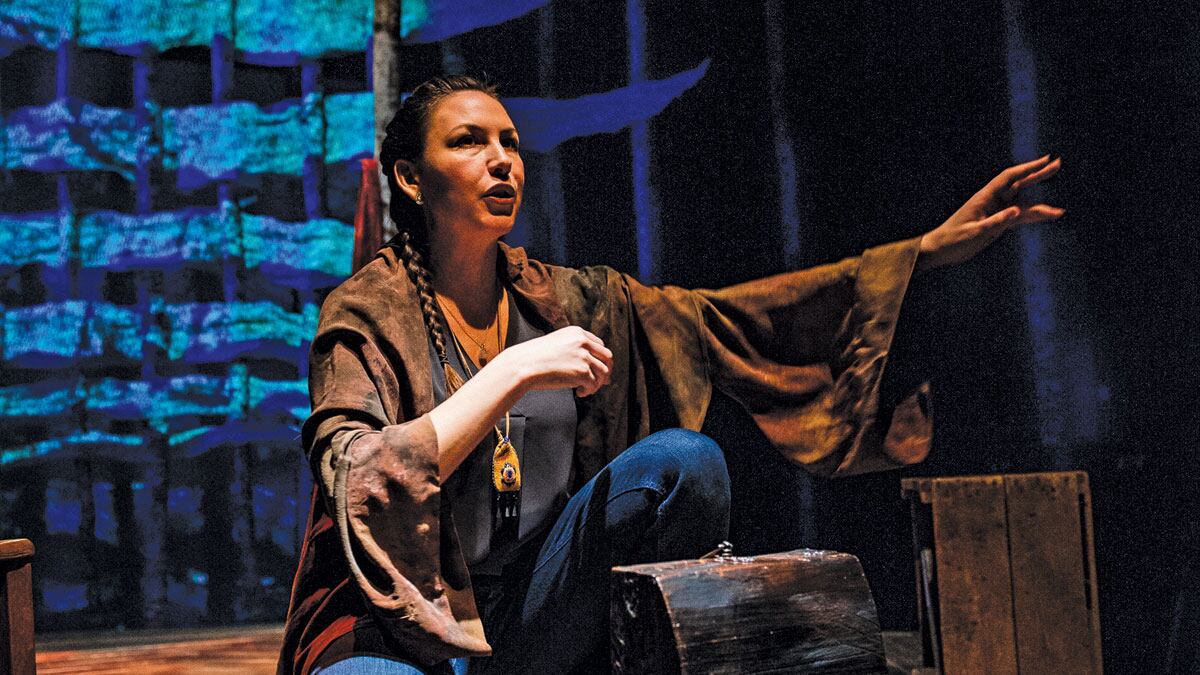In And So We Walked, playwright and performer DeLanna Studi recounts an early memory. The child of a white mother and Cherokee father, her father once told her, "You will be a bridge between your mother's people and mine." Instead, she tells us, she's more of an island between two shores.
And So We Walked is Studi's first play. It's getting its premiere at Portland Center Stage, where she recently starred in Astoria. Throughout the autobiographical performance, Studi explores her relationship with her father and her Cherokee heritage. This culminates in a six-week, 900-mile trip along the Trail of Tears that she persuades her father to take with her.
The Trail of Tears was the U.S. government's forced migration of 17,000 Cherokee people to Oklahoma. Thousands lost their lives along the way. Almost 200 years have passed since, which isn't as long ago as it sounds. Many present-day descendants still live in Oklahoma and are still impacted by the trauma of history. And So We Walked is the story of Studi's quest to heal those psychic scars, or at least learn how to better understand them.
The heart of the play is Studi's bond with her aging father. As a child, her father was a source of quiet strength who tried to instill pride in her about their shared heritage. Once, a teacher informed her that "real Indians are extinct." When she told her father, he took the day off from work to go to his daughter's school and tell her teacher, "We are still here. We are not extinct."
As an adult, Studi realizes her father had his own experiences to grapple with. Studi recounts her father's time at an infamous boarding school run by the Bureau of Indian Affairs. Boarding schools like her father's were all over the U.S. in the 19th and 20th centuries. Officially, their mission was to help young Native Americans assimilate into American culture. Unofficially, their motto was to "kill the Indian and save the man."
Most of the props for And So We Walked are suitcases, boxes and bags, containers and compartments. Studi takes a suitcase with her on her trip to the Trail of Tears. She has bags with her whenever she's on the road or sleeping on someone's couch, which, as a working actress, is often. For most people, the contents of the bags are what is important. For Studi, it would seem that merely having the bags themselves is what matters.
It's a brilliant and subtle visual motif. Baggage can be used for containing belongings or keeping them separate. It can be something you choose to take with you, or something you have no choice but to carry.
The stage for And So We Walked is decorated with hanging tree trunks that look like the forests along the Trail of Tears. There are swaths of cloth woven into the trunks, perhaps to symbolize that Studi's story belongs to the terrain.
Throughout the play, images representing part of Studi's journey are projected onto the trees. It's a cool idea, but the images are impossible to see on the tree trunks and textured material. That's especially frustrating when Studi references the written Cherokee language, but the characters are obscured by the surface.
But that doesn't change that And So We Walked is a fascinating story that's deep with humor and understanding. Studi delivers a sincere and passionate performance as herself, her father and a multitude of other characters.
Early in the play, there's a moment when Studi says that for much of her life, people have asked her "what" she is. "There is not enough time to unpack the privilege in that question," she tells the audience. Interestingly, one of the things that And So We Walked is most successful at doing is just that—unpacking the privilege in that question, or at least beginning to do so.
SEE IT: And So We Walked is at Portland Center Stage, 128 NW 11th Ave., pcs.org. 7:30 pm Tuesday-Sunday, noon Thursday and 2 pm Sunday, through May 13. $25-$47.
